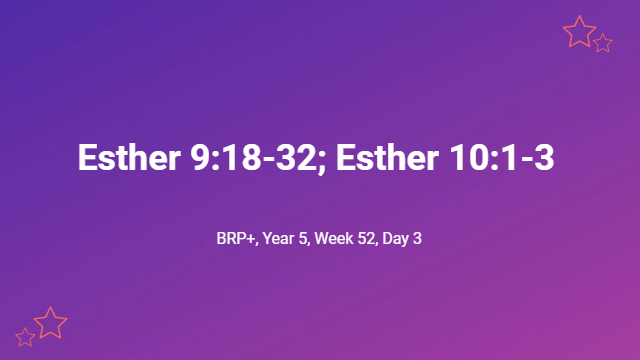Esther 9:18-32; Esther 10:1-3
Q.1. How did the Jews commemorate their deliverance from extermination? Why was it called the Feast of Purim? How did the king learn of Haman’s scheme to destroy the Jews? Why was it decided to celebrate Purim? – (Est.9:18-28)
The deliverance of the Jews from annihilation was marked by annual celebrations that were attended with the giving of food, including to the poor. The Jews who were scattered in the outlying towns of the empire, travelled to the capital (Esth.9:18-22). They were able to remove their enemies, including the perpetrator of the purge, when he – … had cast Pur, that is the lot, to disturb them and destroy them (Esth.9:24). The feast came to be known as Purim – Therefore they called these days Purim after the name of Pur … (Esth.9:26). Purim was made a Jewish tradition by Esther and Mordecai, who – 27 … established and made a custom for themselves and for their descendants and for all those who allied themselves with them, so that they would not fail to celebrate these two days according to their regulation and according to their appointed time annually. 28 So these days were to be remembered and celebrated throughout every generation, every family, every province, and every city; and these days of Purim were not to fail from among the Jews, or their memory fade from their descendants (Esth.9:27-28). Though God’s name is not mentioned in the Book of Esther, His name is written all through it. It is a national testimony to God’s saving grace, and His intervention on behalf of His own.
Q.2. How did it become law in the Persian Empire to celebrate Purim? What guidelines for the celebration were written? Was Mordecai’s greatness just a Jewish story? How far did Mordecai’s blessing extend? – (Est.9:29-32; 10:1-3 c.f. Jer.29:4-7)
King Ahasuerus gave authority to Esther, because he loved her for her wisdom and courage. He also recognized that Mordecai had proven his loyalty to him (Esth.9:29 c.f. Esth.2:17,21-23; 6:1-9). Therefore, Esther and Mordecai were authorised to proclaim Purim as a special day in his empire – the command of Esther established these customs for Purim and it was written in the book (Est.9:32). As did Joseph for Pharaoh, Mordecai’s administration made Ahasuerus greater (Esth.10:1 c.f. Gen.47:20-26). He understood his place as a citizen, and sought the welfare of the nation he embraced – 2 and all the accomplishments of his authority and strength, and the full account of the greatness of Mordecai to which the king advanced him, are they not written in the Book of the Chronicles of the Kings of Media and Persia? For Mordecai the Jew was second only to King Ahasuerus, and great among the Jews and in favour with his many kinsmen, one who sought the good of his people and one who spoke for the welfare of his whole nation (Esth.10:2-3 c.f. Jer.29:4-7). Mordecai was a faithful servant who was not ashamed to be identified with his people.

